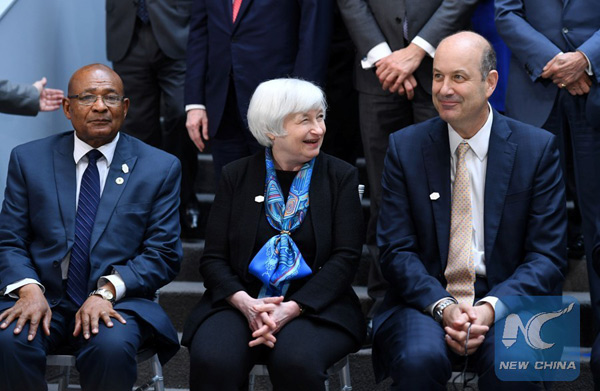G20 finance ministers reach consensus on free trade, open markets
 |
|
Federal Reserve chair Janet Yellen(center) is seen before a family photo with G20 finance ministers and central bank governors in Washington DC, capital of the United States, April 21, 2017.[Photo/Xinhua] |
WASHINGTON - Finance ministers from the Group of 20 leading economies have reached a broad consensus that free trade and open markets is better for promoting global economic growth, German senior officials said on Friday.
The general mood of the discussion was a broad agreement in the direction that "free trade is better for global growth and better for every national economy concerned as well," German Finance Minister Wolfgang Schaeuble said Friday after wrapping up a meeting of the G20 finance ministers and central bank governors here.
"Protectionism would be damaging to the global economy and the concerned economies as well. There was a broad consensus," Schaeuble, whose country holds the G20 presidency this year, said at a press briefing on the sidelines of the Spring Meetings of the International Monetary Fund (IMF) and the World Bank.
"Almost everybody underscored the importance of open markets and free market access, so that was a consensus in the meeting," Jens Weidmann, president of the German central bank, said at the same press briefing.
Citing of discussions about current account balances during the meeting, Weidmann said, ministers agreed that the policy response would be "opening more markets" rather than raising trade barriers.
The task of the G20 finance ministers' meeting is to articulately discuss these issues in a way that's helpful to "get things moving to the right direction," Schaeuble said, noting that G20 policymakers have to do more to "make the economy more inclusive" and address negative effects of globalization.
"We need to tackle this, otherwise we'll see more protectionism," he added.
Weidmann also said the G20 should focus more on inclusive growth as the lack of structural reforms dampens growth prospects and "rising inequality puts the strain on potential growth."
"When the inequality rises, there is a risk of course of people increasingly becoming disenchanted with globalization," he said, adding reducing inequality with economies will remain at the top of the G20 agenda under the German presidency.
The IMF on Tuesday raised its forecast for global economic growth this year to 3.5 percent, but warned that inward-looking policies threaten global integration and the cooperative global economic order.
"Avoiding the damage from potential protectionist measures will require a renewed multilateral commitment to support trade, paired with national initiatives that can help workers adversely affected by a range of structural economic transformations including those due to trade," IMF chief economist Maurice Obstfeld told reporters.
The Group of 20 include Argentina, Australia, Brazil, Canada, China, France, Germany, India, Indonesia, Italy, Japan, the Republic of Korea, Mexico, Russia, Saudi Arabia, South Africa, Turkey, the United Kingdom, the United States and the European Union.
- Protectionism: a G20 point of concern
- Trade, exchange rate might dominate G20 topics in Germany's Baden-Baden
- Outcome documents selection of Hangzhou G20 Summit published
- Xi's speeches at G20 Hangzhou Summit published
- Xi set to champion globalization and free trade during visit
- Free trade a way to promote global prosperity








